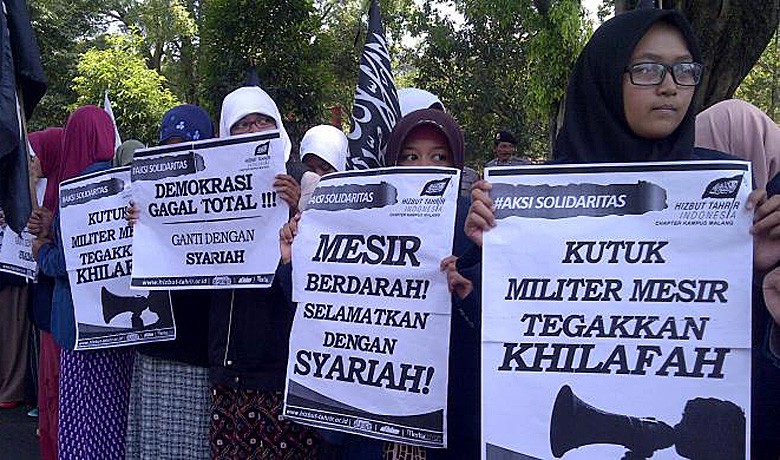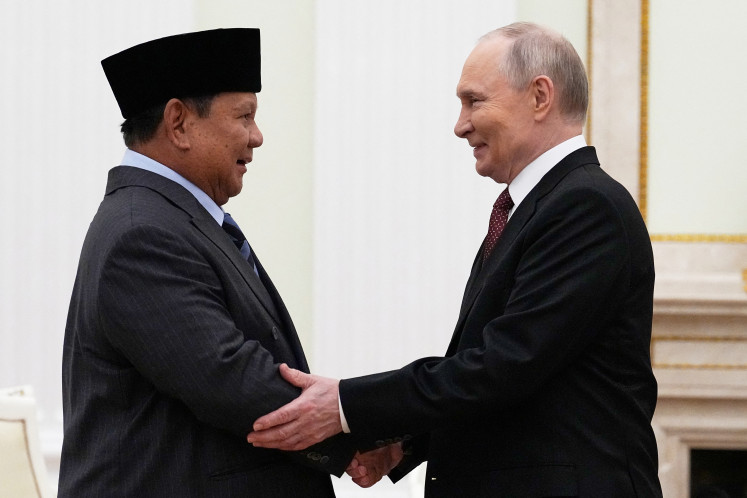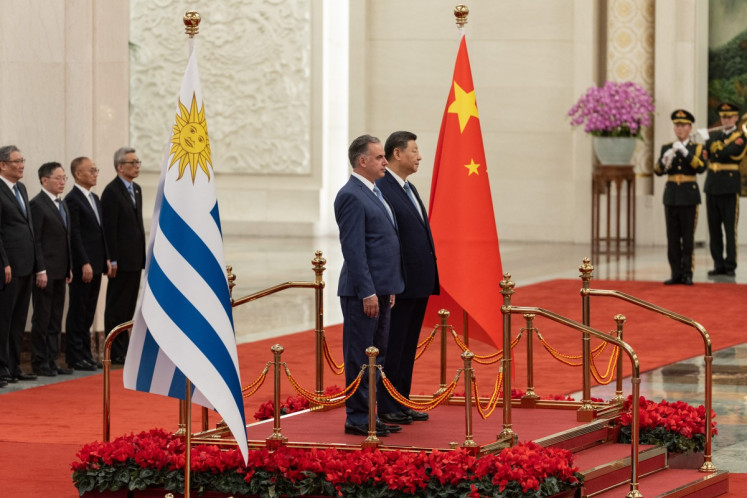Popular Reads
Top Results
Can't find what you're looking for?
View all search resultsPopular Reads
Top Results
Can't find what you're looking for?
View all search resultsInsight: Is Hizbut Tahrir a threat to Indonesia?
Hizbut Tahrir Indonesia (HTI) is one of the leading radical organizations in Indonesia. While the ban was supported by some within Indonesia, others have argued that this measure limits freedom of speech in Indonesia and hence is viewed as an attempt by the government to silence dissent. #insight
Change text size
Gift Premium Articles
to Anyone
H
izbut Tahrir Indonesia (HTI) is one of the leading radical organizations in Indonesia. The group’s notoriety grew in 2017 when the government banned it through a decree signed by President Joko “Jokowi” Widodo for opposing the state ideology Pancasila and seeking to establish a caliphate. While the ban was supported by some within Indonesia, others have argued that this measure limits freedom of speech in Indonesia and hence is viewed as an attempt by the government to silence dissent. My own research on HTI suggests that regardless of the ban, HTI was a movement on a decline.
HT was founded in 1953 with the aim of setting up an Arab caliphate in the Levant area with the aim of emancipating Palestine. In Indonesia, the seeds of HT were sown by Abdul Rahman Al-Baghdadi, a Lebanese born Australian who was invited to teach at the famous Al-Ghazali Islamic boarding house established by the prominent Indonesian religious figure, Abdullah bin Nuh.
Despite Indonesia being one of the largest Muslim countries, the HT leadership was not interested in supporting Al-Baghdadi in his efforts to establish a chapter of HT in the country. For them, the priority is to establish a caliphate in the Middle East.
It was not until 1998 that HTI came under the official structure of the global HT movement. HTI became the legal outfit in 2000 after the collapse of the New Order regime and has since grown with a presence in all Indonesian provinces.
Ironically, the scale of the alleged threat posed by HTI has been fed by members of HTI themselves. Estimates of HTI’s membership range from several hundred thousand to several million. These numbers are a gross exaggeration of the actual strength of the group.
In 2014, a former chairman of HTI told me that its membership stood at 30,000 members, a number that pales in comparison to other groups. Likewise, HTI members tend to overstate the group’s relationship with important political and military figures in Indonesia. The impression created is that these figures comprising important members of the Jokowi administration are sympathizers of HTI simply because they spoke at events organized by HTI.
While it is true that HTI has a significant following amongst students, the enthusiasm for the group would often wane several years after they graduate. The claim that HTI was instrumental in organizing the 212 rallies against the governor of Jakarta in 2016 does not hold water. While HTI members attended the rallies, none of the HTI leaders was represented in the organizing committee of the rallies which was largely supported by the Islam Defenders Front (FPI) and the Muslim Community Forum (FUI).
The formation of the Islamic State (IS) is perhaps the biggest challenge encountered by HTI and its parent organization, HT. While, HT has struggled for the creation of the caliphate for more than six decades without any success, IS was able to establish an actual state. Many members of HT had initially expected the HT leadership to pledge allegiance to the IS’ caliph, Abu Bakar Al-Baghdadi, but was sorely disappointed when the ameer of HT, Khalil Ata Abu-Rashta declared the IS’ caliphate illegitimate and a Western conspiracy to divide the Muslim World.
It also declared the violence perpetrated by IS un-Islamic. Nonetheless, a small number of HT members left HT to join IS. In Indonesia, the most prominent former HTI member to join IS is Bahrum Naim, who was responsible for planning a number of terrorist attacks in Indonesia.
The IS issue also resulted in the rupture of HT internationally. Till date, at least two members of HT central leadership and key leaders of HT in Tunisia, India, Lebanon, Kuwait, Turkey, Bangladesh, Denmark and the United Kingdom have left the group due to their dissatisfaction with the ameer of HT.
The dissatisfaction was over the decision of the ameer to provide arms to members of HT in Syria to fight against the regime of Bashar Al-Assad. The transfer of arms was apparently done under the auspices of the Turkish military. This runs contrary to the principles of HT that consider all Muslim governments as illegitimate and hence forbids any cooperation with these governments.
Likewise, HT’s charter clearly states that a “jihad” can only be declared by a caliph and since there is currently no legitimate caliph, it is illegal for the ameer to support an arm struggle in Syria. This disagreement with the ameer has resulted in significant number of HTI leaders leaving the organization. This exodus of leaders is likely to see the disintegration of HTI.
It cannot be denied that a group like HTI posed a genuine challenge for the Indonesian authorities due to its anti-Pancasila ideology and caliphate objective. Nonetheless, my research suggests that HTI remains a fringe movement within Indonesia. It is likely to die a natural death due to the rupture of the group internationally and its crisis of legitimacy regardless of the ban.
In fact, the real challenge for the Indonesian state lies in HTI’s offshoot groups such as the FUI and newer groups that could splinter out of HTI due to the ban. These groups are likely to be more radical as demonstrated by the case of FUI.
In summing up, the banning of HTI could have been a case of barking up the wrong tree.
***
The writer is an assistant professor at the Nanyang Technological University and the author of Hizbut Tahrir Indonesia and Political Islam: Identity, Ideology and Religio-Political Mobilization (London: Routledge, 2018).











